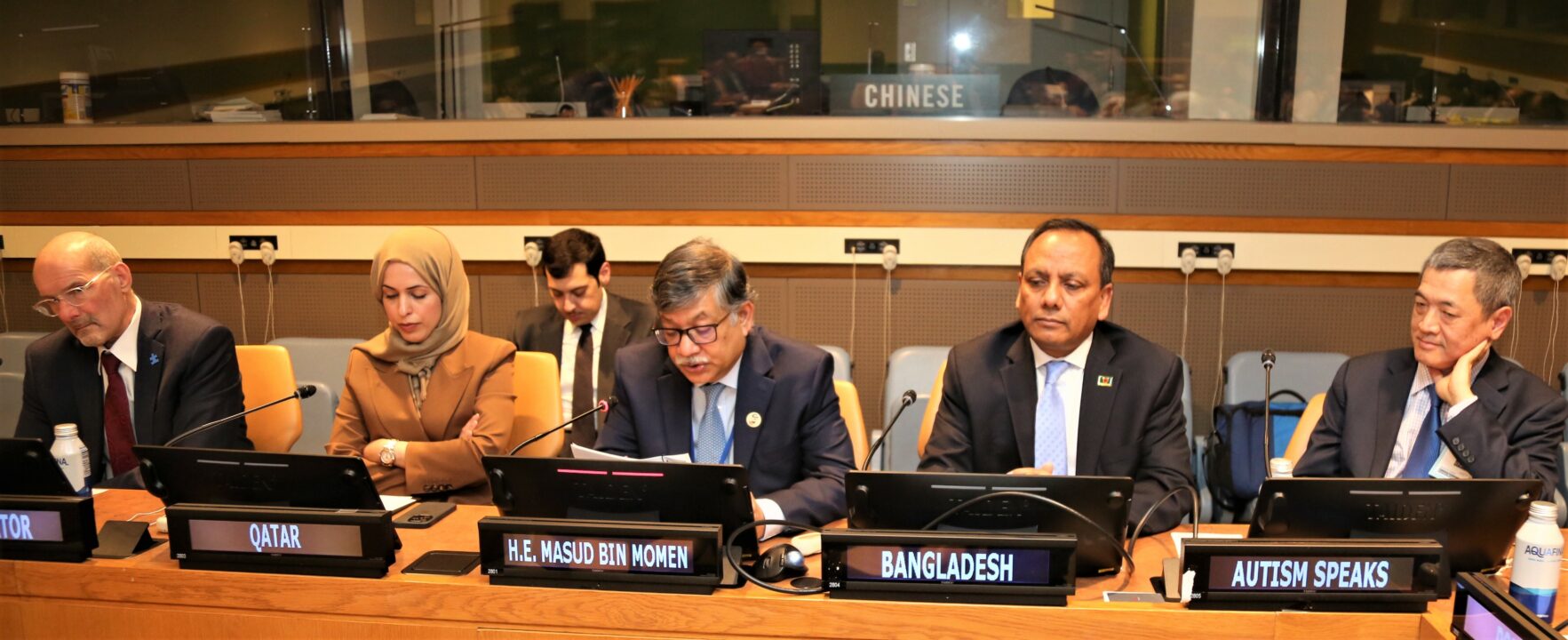Ambassador Muhammad Abdul Muhith, PR of Bangladesh
Ambassador Alya Ahmed Saif Al-Thani, PR of the State of Qatar
Distinguished speakers and expert panelists,
Dear friends with special ability and their family members,
Excellencies, Ladies and Gentlemen,
I wish to congratulate all of you for your presence today to celebrate the World Autism Awareness Day 2023. I thank the missions of Bangladesh, the State of Qatar and WHO for co-hosting the event today.
It is my pleasure to join you once again in this event which brings back memories of co-hosting this event with the State of Qatar for 4 consecutive years during my time here in New York from 2015-2019. And it is great to see so many familiar faces again.
I would like to express my sincere thanks to WHO for announcing the upcoming release of its first-ever report on children with developmental disabilities. I understand the report aims to accelerate actions to mainstream children with Autism Spectrum Disorder (ASD).
Dear Friends,
By definition, ASD is a lifelong disorder characterized by persistent deficits in social communication and restrictive and repetitive patterns of behaviour. Autism is now widely considered to be a relatively common condition, comprising about 2% of eight-year-old children today and rates of autism diagnosis have continued to increase in recent years. Findings published by US CDC earlier this month indicate higher ASD prevalence than previous estimates. Among the 8-year children, 1 in 36 have been identified with ASD, which is higher than 2018 estimate that found a prevalence of 1 in 44.
As such, healthcare systems are not only failing to provide appropriate care to autistic adults, but also that these failures may be detrimentally affecting the length and quality of life of autistic individuals. The access to autism treatment and care services throughout the life course are still unmet.
Therefore, the theme of the discussion today- Inclusion for health through the life course -is timely.
Dear Colleagues and Friends,
When we think about someone with autism, we generally imagine the face of a child. Although the core characteristics of ASD typically appear during childhood, most individuals with ASD continue to experience these characteristics in adulthood and later period of their lives.
We have made significant progress in improving access to opportunity for children with developmental disabilities in recent years- for their education and learning, for treatment and care services, and for other social activities. However, as they grow up, autistic individuals may still experience challenges in social connectedness, learning, carrying out basic daily routines and having gainful employment due to social stigma attached to ASD. In many cases, adults with autism are very uncomfortable with change they face with. Consequently, they might struggle with planning ahead or preparing themselves for the uncertainties of the future. They feel excluded. Covid-19 and post covid challenges and uncertainties have exacerbated such exclusions.
Autistic adults are also more likely to have chronic health conditions alongside lower quality healthcare than others. Health inequalities between the adults with autism and non-autistic adults are widespread. Unfortunately, such inequalities existed before and have persisted after the onset of the Covid-19 pandemic. Research suggests that autistic adults have an increased poorer physical and mental health, alongside increased risk of premature mortality, and greater annual health expenditure than non-autistic adults overall and across nearly all specific areas of healthcare.
Ladies and gentlemen,
Bangladesh is committed to addressing the systemic barriers people with autism face in their daily lives. We have seen tremendous increase in awareness on autism in the past decade, thanks to Ms. Saima Wazed, Chairperson of Bangladesh National Advisory Committee on Autism and Neurodevelopmental Disorders, who was the inspiration behind our efforts. Various stakeholders, ministries and departments have worked together to mitigate the challenges and stigma faced by the persons with autism.
We have enacted Rights and Protection of Persons with Disabilities Act 2013 and Neuro-development Trust Act 2013. We have established special school for persons with ASD. More than 100 Autism and Neurodevelopmental Disorder centers have been established to facilitate early detection, assessment and interventions, and we have introduced capacity building trainings for caregivers. Our government has been promoting a ‘culture of innovation’ and encouraging persons with disability and those working with them to take advantage of the assistive tools and technologies. ‘Digital Bangladesh’ initiative has opened a new era extending disability inclusive e-service, websites and other ICT-based services. With the use of internet, smart phone apps and other tools they can deliver many things today.
Simultaneously, with our national efforts, we had been advocating the issue at the UN, including through adopting UNGA resolution, and co-hosting the “World Autism Awareness Day” every year since its launching in 2007. We also made specific commitments in the Second Global Disability Summit 2022 to address the challenges Autistic persons face while receiving education and healthcare.
Excellencies, Ladies and Gentlemen,
On World Autism Awareness Day, we reaffirm our commitment to ensuring that over 75 million people in the world who live with autism can make the most of their talents and participate fully in our societies. We also applaud all doctors, educators, researchers, advocates, family members, caregivers, and others who support them.
I hope that the insights shared today will help bring awareness to challenges an autistic adult may face in accessing health benefits, and identify strategies to minimize barriers to access. As a global community, we need to address these challenges.
We live in hope that the society can change to allow autistic people to live a valued life through a whole-of-the-society approach in an inclusive and strengthened heath care system.
I thank you all.

